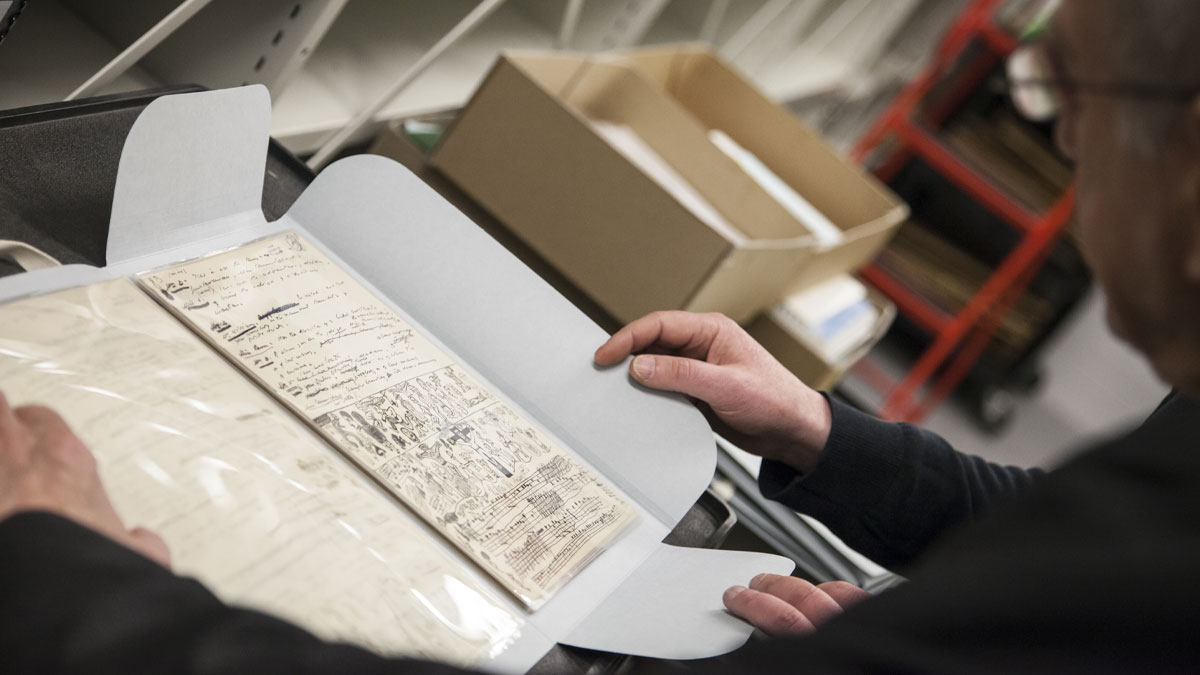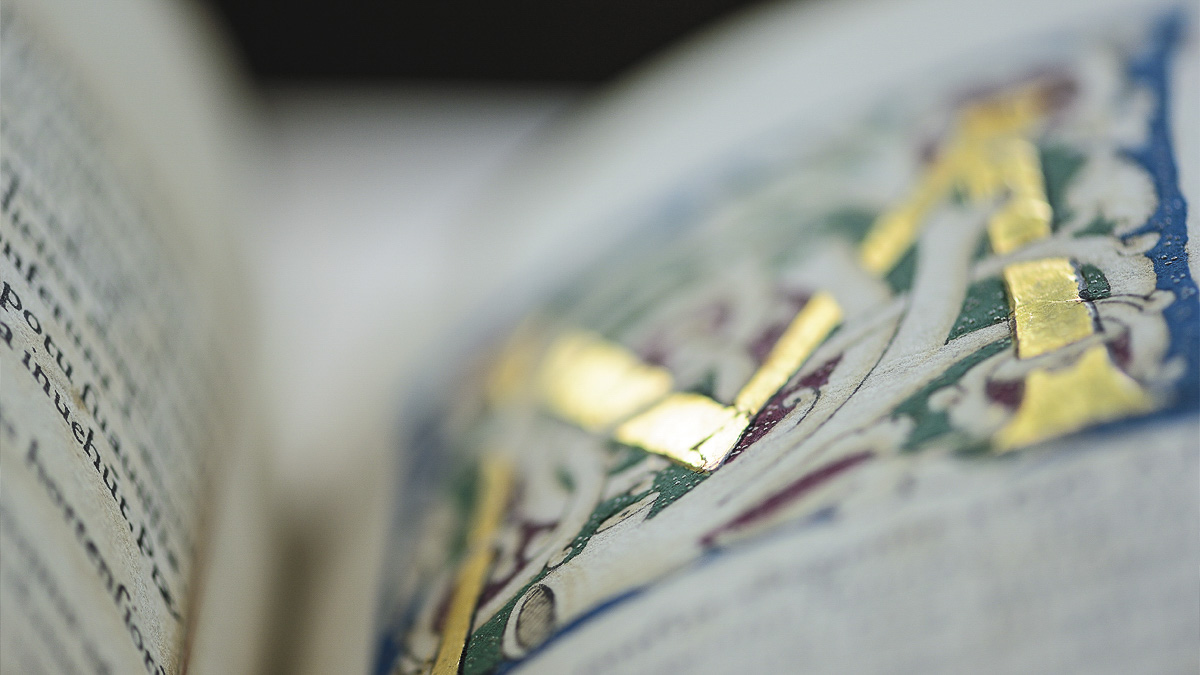Samuel Beckett research centre
Researchers within English contribute significantly to making the University of Reading a global epicentre of research on Samuel Beckett.
The University's Beckett Archive houses the largest collection of materials relating to Beckett in the world and has achieved Designated Status by the Museums, Libraries and Archives Council (MLA) as a "pre-eminent collection of national and international significance". University researchers from the English, French, and Film, Philosophy and Theatre and Television Studies (FTT) work collaboratively within the Samuel Beckett Research Centre
Several major research projects are ongoing, including the Beckett Digital Manuscript Project
Book History
Book and publishing history is a long-standing and distinctive research focus of the department, with active collaborations in Modern Languages, Typography & Graphic Communication, and the University's Special Collections, as well as national and international partnerships.
The University houses the Archive of British Publishing and Printing, which has been designated an 'Outstanding Collection' by the Museums, Library and Archives Council and which supports research by colleagues within the department, postdoctoral and postgraduate researchers, as well as undergraduate projects.
Our research is supported by the interdisciplinary Centre for Book Cultures and Publishing (CBCP). CBCP undertakes research in book cultures and publishing with a distinctive global, multilingual and multidisciplinary focus. The Centre aligns expertise in English, Spanish, French, German and Italian-language publishing and book history, with transatlantic and European research partnerships in typography and book design (Latin and non-Latin scripts), and in the printing and publishing trades.
We work with partners locally and internationally across publishing and the cultural industries. Researchers in the centre have shared interests in the materiality of text and image (both analogue and digital), in how digital methods can enhance scholarship, and the ways in which books are produced, distributed, and read in global contexts today and in the past. CBCP is co-directed by Dr Nicola Wilson from within the department. DEL researchers who contribute to CBCP include Dr Paddy Bullard, Dr Mark Nixon, Professor Peter Robinson, Professor Michelle O'Callaghan, and Dr Mary Morrissey.
CIRCL: Children's Literature
Our work in Children's Literature takes place in The Centre for International Research in Childhood: Literature, Culture, Media which was founded by Tony Watkins in 1996. Karin Lesnik-Oberstein took over as the Director of CIRCL in 2003 and works with Sue Walsh and Neil Cocks on different aspects of the cultural construction of the child.
For details of its thriving MA in Children's Literature, its active postgraduate research programme, and its ongoing series of publications, see the CIRCL website.
Early Modern research centre
Much of the department's research into Early Modern Literature is supported by the Early Modern Research Centre (EMRC), which brings together Michelle O'Callaghan, Chloe Houston, Mark Hutchings, Mary Morrissey, and Alanna Skuse with colleagues in History and Politics.
Research conducted within the EMRC addresses a range of areas, including Reformation cultures, travel, diplomatic, and maritime literature and history, concepts of identity and community that engage with medical humanities and history of emotions, and the history of the book and material cultures. For full details of our research, the group's regular research seminars, and its annual international conferences, see the EMRC website.
Graduate Centre for Medieval Studies
The Graduate Centre for Medieval Studies (GCMS)
The GCMS was founded in 1965, making it one of the oldest centres of its kind. It is made up of academic staff and postgraduates from all fields of medieval studies within the university. It also has an extensive range of affiliates and alumni in other universities and research centres in the UK and beyond.
Aisling Byrne from the Department of English Literature is a member of the centre and is editor of the centre's annual peer-reviewed journal, Reading Medieval Studies.
The GCMS offers an interdisciplinary MRes in Medieval Studies. It also runs an annual programme of visiting speakers and a Summer Symposium. See the the GCMS news and events for more information.
Centre for Health Humanities:
The Centre for Health Humanities lead by Professor Andrew Mangham and includes Dr Alanna Skuse from English Literature. The Centre's interests explore the ways in which the arts and humanities intersect, reside within, and enrich our understandings of health, sickness, and wellbeing.
The Centre's vision involves a distinctively holistic approach to health, which encompasses narratives of a variety of conditions, stages, and outcomes of illness, from 'perfect recovery' and wellbeing, to abnormal development, self-mutilation, starvation, and death.
We seek to broaden and rebalance our overall picture of the human condition by looking at the complex ways in which the arts and humanities interact, and often come into conflict with, the health sciences. We benefit from teamwork with a wide variety of scholars from archaeology, history, pharmacy, psychology, linguistics, and modern languages, as well as with artists, clinicians, and policy makers.
Follow us on Twitter: @healthhums
Archives and Materialities:
Our research comes together through a shared interest in the materiality of texts, literary history, and investment in questions about writing, authorship, editing, publishers, audiences and readers.
We work with different literary forms and media - including manuscripts, drama, pamphlets, digital texts - and across different literary periods, from the medieval (Dr Aisling Byrne) and early modern (Dr Mark Hutchings and Professor Michelle O'Callaghan), through the seventeenth and eighteenth centuries (Dr Paddy Bullard), to the Victorian period (Professor Andrew Mangham) and the modern and contemporary (Dr Mark Nixon and Dr Nicola Wilson).
We lead a dynamic area of interdisciplinary research and have regular seminars and public events, supported by the Centre for Book Cultures and Publishing, Health Humanities, the Early Modern Research Centre, Beckett at Reading, and the Graduate Centre for Medieval Studies. We support several doctoral and postdoctoral projects, often using UoR Special Collections, and would be delighted to welcome research proposals in our areas of expertise.
Identities:
The 'Identities' research cluster brings together staff and postgraduates who share an interest in the discursive construction of identities. Between us we work with texts of various kinds - fiction, non-fiction, poetry, drama, sermons and travel writing - from the early modern period (Dr Chloë Houston, Dr Mary Morrissey, Dr Alannah Skuse), through the nineteenth and twentieth centuries (Dr Stephen Thomson), to the contemporary (Dr Nicola Abram, Professor David Brauner, Professor Bryan Cheyette).
Our methodologies range from close reading (Dr Neil Cocks, Professor Karin Lesnik-Oberstein, Dr Sue Walsh) to archival scholarship (Dr Nicola Abram, Dr Sue Walsh).
The group meets termly to discuss and advance our research activities, and periodically organises larger events such as the conferences/symposia: 'The Ghetto: From Venice to Chicago' (Birkbeck and Reading, 28 March 2017), 'Ayn Rand from the left: Questioning Rand through literary theory, questioning literary theory through Rand' (Reading, 13 November 2018), and 'Exploring authenticity in contemporary literatures in English' (Reading, 1-2 November, 2021).
We value the role of the arts and humanities in wider society, and as well as publishing academic articles, chapters and books, group members regularly appear on radio programmes, feature in the press, and give public talks.
Creativity:
The Creativity Theme in the Department of English Literature draws upon its research, practice, and teaching in poetry, poetics, and creative writing. It is focused around the multifarious activities of its three scholar poets, Peter Robinson, who founded Creative Writing at Reading in 2007, Conor Carville, who directs the current pathway and joint degree offering, and Steven Matthews. The novelist Shelley Harris has recently joined them, while John Scholar, Matthew Scott and Yasmine Shamma contribute to the theme's interests in aesthetic philosophy, poetic and cultural practice, and engagement with the other arts.
The theme supports the teaching of higher degrees and post-doctoral study and collaborates with the Centre for Book History and the Department's other themes. It has received awards from various funding bodies for its programme of research and publication.
The Creativity Theme regularly hosts high-profile poetry readings, organizes the annual Gerard Finzi Lecture, and has followed upon the inaugural Reading Poetry Festival of 2013 with a series of such events and annual symposia, some in collaboration with the International Poetry Studies Institute at the University of Canberra. It works closely with Two Rivers Press, the Reading-based publishing company, whose poetry list is edited by Peter Robinson.



